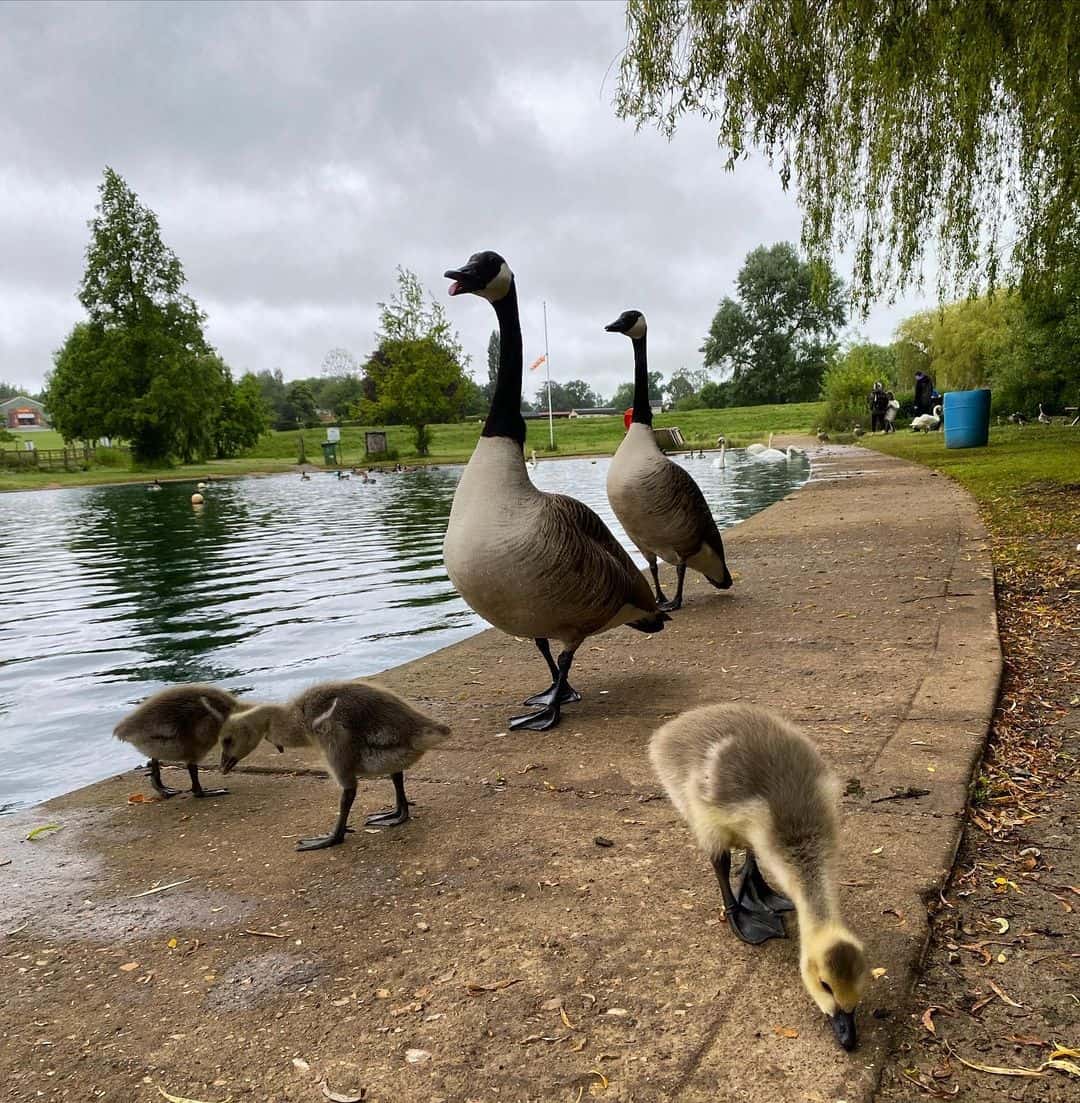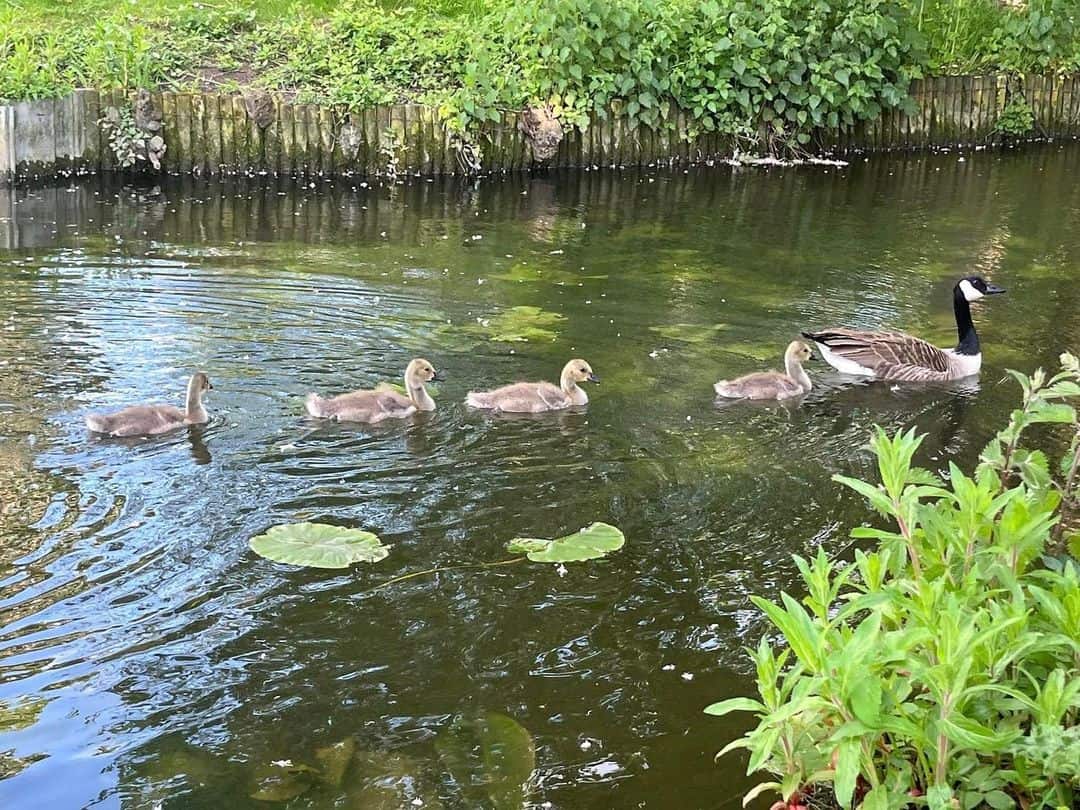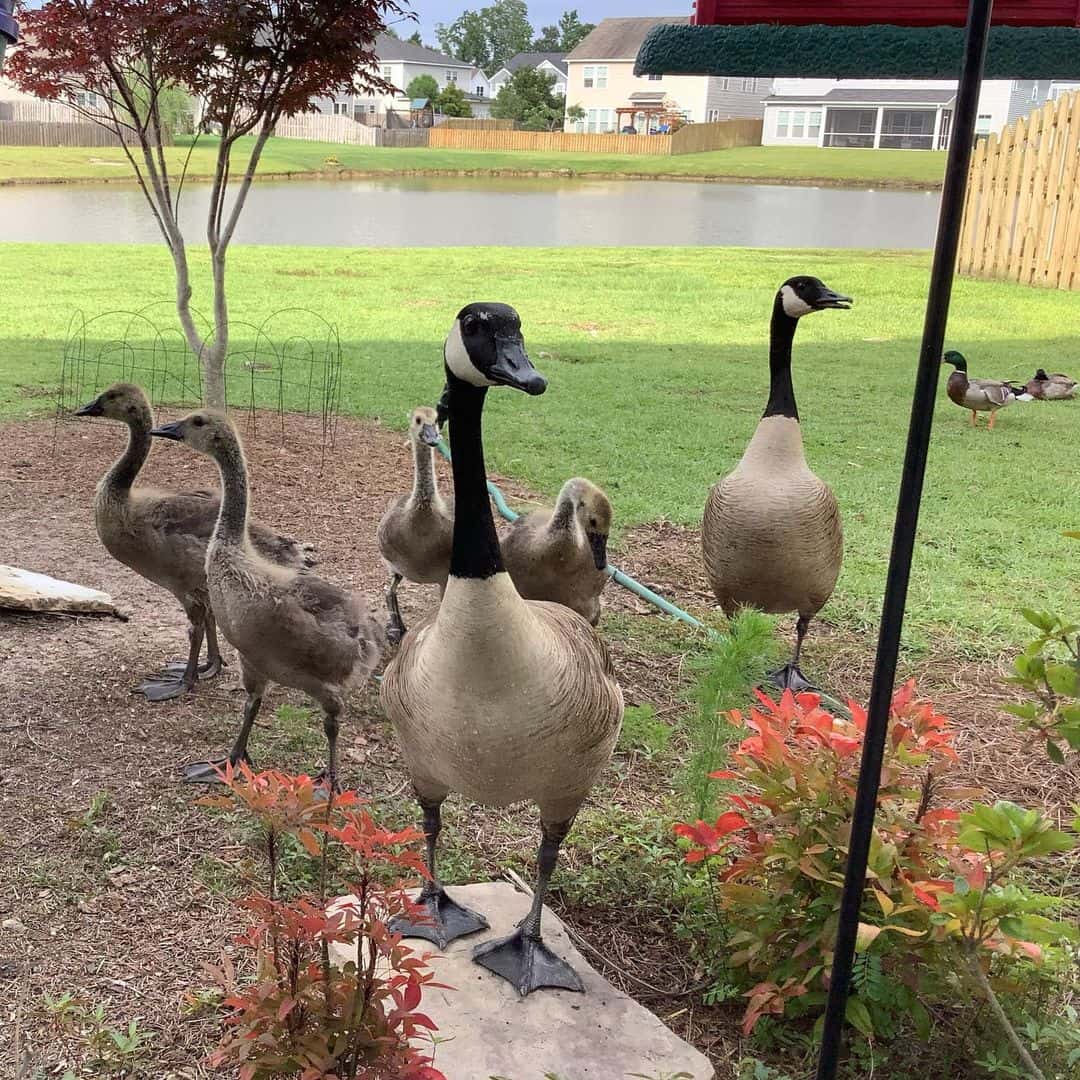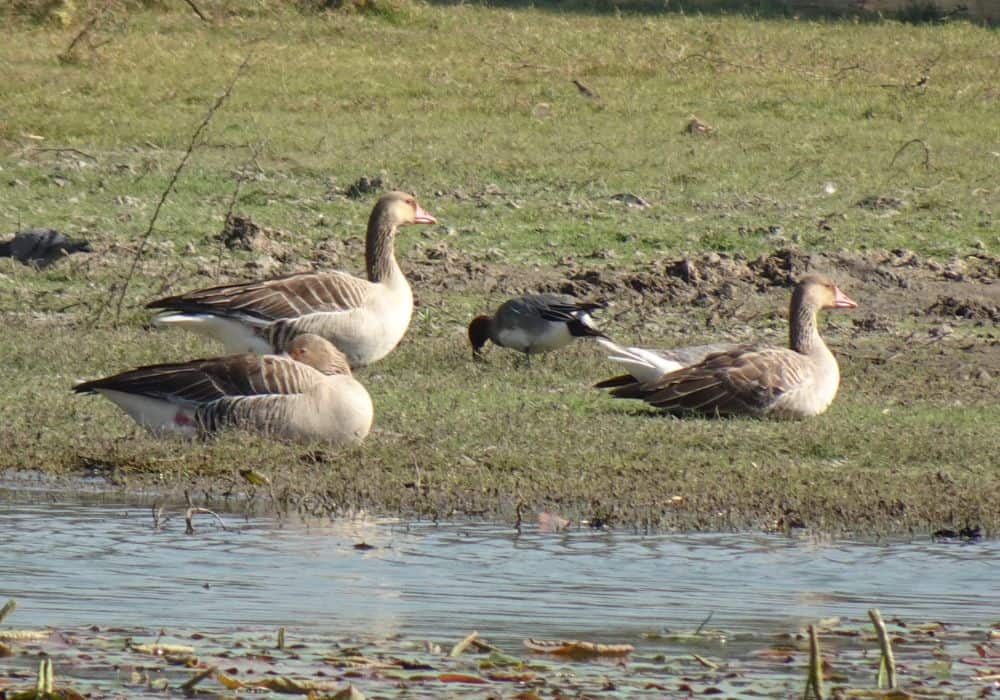Elegant and stunning, geese exude a majestic charm that is hard to ignore and adds a sense of beauty to our natural surroundings.
And when they take up to the sky with their wings outstretched and glide effortlessly, these creatures leave you with a breathtaking sight.
For centuries, geese have been adored for their beautiful feathers adorned by a striking blend of colors. If that’s not enough, they often signal changing seasons with every migration.
Despite their beauty and benefits, geese can be a nuisance for homeowners when they invade their spaces.
Once a flock of geese gets comfortable on your property, they can cause several problems. From pooping everywhere to honking all day, every day, these birds can become a real headache.
Are you dealing with a geese problem? Worry not! You have landed on the right page. Here, we will explore the most effective and safe ways to get rid of geese and regain control over your turf.
Why Are There Geese on My Property?
After months or years of maintaining your landscaping, it’s disappointing to come home to a flock of noisy and aggressive geese.
However, swans are not uncommon in private ponds, lakes, yards, golf courses, home properties, and restaurants.
Geese are naturally drawn to these areas because of two main reasons: abundant food sources and water.
Most types of geese, like Canada geese, are herbivores. They often consume a variety of aquatic plants, like eelgrass, and terrestrial food, like berries and grains. Birds that have adapted to urban and city lifestyles usually eat human food and garbage.
So, if your property has abundant food sources, like Kentucky bluegrass, love cloves, or garbage, it’s a goose magnet.
Geese also love areas near bodies of water, like ponds and lakes. The birds typically spend the most time on the water and even sleep there to avoid predators.
Furthermore, they prefer open spaces like golf courses because they can easily spot predators from afar and take to the sky easily.
Besides, geese also thrive in other areas, including:
- Marshy areas or swamps with wetland grasses
- Parks at airports
- Lawns of homeowners
- Cornfields
- Parks on college campuses
When they build their nests in such areas, they are considered pests for many reasons. Below, we have highlighted a few.
Why Should You Get Rid of Geese?

Image Credit: publicprophile
1. Geese Can Overgraze a Lawn or Field
Geese are unique birds since they can thrive on a diet of grass. They particularly love the Kentucky Bluegrass, often found in meadows. The grass is packed with essential nutrients and minerals the birds require to maintain good health.
If a flock of geese lands on a lawn, golf course, or park, they can devour all the grass. As a result, they can turn the area into a barren mess.
Keep in mind, repairing and re-seeding a lawn can set you back thousands of dollars. Sadly, this is not an effective solution, as the birds will return yearly and graze on your field again.
2. Geese Are Aggressive
During mating, male geese often show aggressive tendencies toward other males. They are also violent when mating or protecting their hatchlings.
Most times, adult geese will chase, bite, or flap their wings at people, pets, and other animals that might venture into their territory.
If this happens near or in a business area, like a restaurant, the enterprise might lose its customers and income.
3. Geese Are Prolific Waste Producers
Cleaning up goose dropping from a lawn or yard is a difficult job. On average, a single goose can poop every twenty minutes and produce up to 2lbs of poop a day.
Their droppings are large and messy and can engulf the whole yard with an overwhelming smell within a short period. The rotten odor can spread to neighboring areas, making eating, shopping, and even living nearly impossible.
But that’s not even the tip of the iceberg:
Geese droppings have high nitrogen content, which promotes excessive algae growth in water bodies. They also carry bacteria and viruses like E. coli, which contaminate water sources.
Humans who come into direct contact with the poop could also get infected with parasites like cryptosporidium and giardia. The former poses a serious health risk because it causes the following symptoms in the infected:
- Weight loss
- Fever
- Vomiting
- Nausea
- Dehydration
- Stomach Cramps
Even worse, these birds do not poop on lawns alone. As long as there is a surface, geese will poop on it. This means you can find geese dropping on asphalt, wood decks, water fountains, and concrete. And since these droppings are extremely acidic, they can corrode paint on cars.
4. Noise Pollution
Another problem you might have when dealing with flocks of geese nesting in your field is noise pollution. These creatures make loud noises, especially during mating or when threatened.
For businesses, the constant honking could drive customers away, causing the venture serious losses.
Additionally, geese could cause car or airplane crushes. A study in 1999 confirmed that geese caused over 90 car accidents. On top of that, geese cause approximately 1,200 aircraft strikes annually.
How Do I Get Rid of Geese?

Image Credit: faiths_photos_official
While you cannot permanently get rid of geese, you can employ several tactics to scare or discourage them from nesting on your property. These include:
1. Blocking Off Resources
As established earlier, lawns with well-grown grass act as a goose magnet. Top that with a water source or body, and you will never have peace again.
To prevent these migratory birds from establishing a home on your property, eliminate their food sources. Reduce the size of the mowed grass in your loan and plant more shrubs and bushes. Geese dislike areas with dense vegetation since they won’t spot predators easily.
It helps to remove bird feeders on your field that might attract the geese. You should also avoid living trash bins with garbage open.
What if you have a pond?
Well, geese hate restriction. So, you can install a physical barrier like netting around the water body. You can also grow a live fence of reeds, native plants, or grasses. This way, the geese will have a hard time entering and leaving the pond.
Once you have removed food and water, the geese will look no longer stop by your property.
2. Chemical Repellants
Another effective way to control geese in your yard is to use a liquid goose repellent. Don’t worry, the chemical will not kill your grass or the birds. Most bird repellants are approved and regulated by the EPA (Environment Protection Agency). Thus, they are safe to use by humans.
The active ingredient in liquid goose repellents is Methyl Anthranilate, a compound found in grape flavoring, like grape Kool-Aid.
While this chemical is safe for humans and pets, it can cause mild irritation in the goose’s nose, eyes, and throat. But it will not harm the migratory birds. Another compound found in these repellants is Anthraquinone, a chemical that influences taste buds.
Spray the repellent on fields often visited by geese. Once the birds realize their food source is no longer sweet and cause them discomfort, they will avoid your property.
3. Visual Deterrents
Geese fall prey to several predators, including coyotes, alligators, raccoons, foxes, and even other birds like eagles and owls. You can use this information to your advantage by deploying predator decoys on your lawn.
The coyote decoy makes the best visual deterrence for swans, followed by alligator heads. It also helps to move the decoy occasionally to mimic the natural movements of predators. This way, the flock will stay away from your lakefront property or sports field.
Moreover, decoys are cost-effective, easy to deploy (and maintain), and can cover large open areas.
4. Use Sound to Scare Aware the Geese

Image Credit: jordanalopes89
Apart from swan decoys, you can use audio deterrents to scare the geese out of your property. Invest in devices that emit ultrasonic frequencies to discourage the birds from landing on your field. Oftentimes, these frequencies disorient the geese, pushing them away from the targeted areas.
Besides ultrasonic devices, check out these options:
- Sound machines: They can create distress calls or predatory calls and scare geese away.
- Wind chimes: In addition to expelling evil spirits, wind chimes can startle geese and prevent them from nesting in your home property or business area.
- Propane cannons: These cannons produce loud noises that repel flocks of geese from an area.
But remember, swans can get used to these sounds, particularly if you are in a noisy neighborhood. So, if you want the best results, pair up visual and audio deterrents. Also, change your tactics periodically to keep the birds guessing and afraid of your property.
5. Prevent the Geese from Nesting
If geese occasionally visit your lawn, it’s more likely they have established their nest there. Locate these nests, then place heavy objects on them, like decorative rocks, which the geese cannot move.
Alternatively, you can coat the swans’ eggs with oil to prevent hatching and control their numbers.
Additionally, you can install a motion-activated sprinkler on your lawn. While geese love water, these sprinklers will startle them.
Bottom Line
As we come to the end of our piece, remember, goose control requires a proactive approach. First, understand the reasons why geese love your property. As established above, these birds will flock to any field with abundant food and water.
Using this knowledge, you can come up with effective control measures. These could include removing food sources, netting or fencing water bodies, or using audio or visual deterrents.
Sure, geese can be a lingering problem if not addressed earlier. But don’t settle for harmful methods to get rid of them. Remember, these amazing birds are federally protected. So, if you harm or kill them, you might find yourself in trouble.
Before addressing your geese problem, call your local wildlife service center or talk to an expert. By doing so, you can familiarize yourself with local laws regarding goose management.
You will also learn geese control techniques that prioritize the health and well-being of both parties (humans and geese).
That said, go forth and reclaim your domain from these honking invaders!
